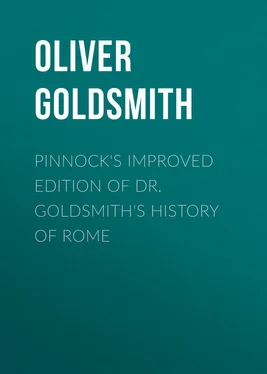Oliver Goldsmith - Pinnock's improved edition of Dr. Goldsmith's History of Rome
Здесь есть возможность читать онлайн «Oliver Goldsmith - Pinnock's improved edition of Dr. Goldsmith's History of Rome» — ознакомительный отрывок электронной книги совершенно бесплатно, а после прочтения отрывка купить полную версию. В некоторых случаях можно слушать аудио, скачать через торрент в формате fb2 и присутствует краткое содержание. Издательство: Иностранный паблик, Жанр: foreign_antique, foreign_prose, на английском языке. Описание произведения, (предисловие) а так же отзывы посетителей доступны на портале библиотеки ЛибКат.
- Название:Pinnock's improved edition of Dr. Goldsmith's History of Rome
- Автор:
- Издательство:Иностранный паблик
- Жанр:
- Год:неизвестен
- ISBN:нет данных
- Рейтинг книги:4 / 5. Голосов: 1
-
Избранное:Добавить в избранное
- Отзывы:
-
Ваша оценка:
- 80
- 1
- 2
- 3
- 4
- 5
Pinnock's improved edition of Dr. Goldsmith's History of Rome: краткое содержание, описание и аннотация
Предлагаем к чтению аннотацию, описание, краткое содержание или предисловие (зависит от того, что написал сам автор книги «Pinnock's improved edition of Dr. Goldsmith's History of Rome»). Если вы не нашли необходимую информацию о книге — напишите в комментариях, мы постараемся отыскать её.
Pinnock's improved edition of Dr. Goldsmith's History of Rome — читать онлайн ознакомительный отрывок
Ниже представлен текст книги, разбитый по страницам. Система сохранения места последней прочитанной страницы, позволяет с удобством читать онлайн бесплатно книгу «Pinnock's improved edition of Dr. Goldsmith's History of Rome», без необходимости каждый раз заново искать на чём Вы остановились. Поставьте закладку, и сможете в любой момент перейти на страницу, на которой закончили чтение.
Интервал:
Закладка:
8. The countries south of the Danube, were subdued and divided into provinces during the reign of Augustus. The number of these provinces was seven: 1. Vindeli'cia, bounded on the north by the Danube; on the east by the Æ'nus, Inn ; on the west by Helve'tia, and on the south by Rhæ'tia: 2. Rhætia, lying between Helve'tia, Vindeli'cia, and the eastern chain of the Alps: 3. Novi'cum, bounded on the north by the Danube, on the west by the Æ'nus, Inn , on the east by mount Ce'tius Kahlenberg , and on the south by the Julian Alps and the Sa'vus, Save : 4. Panno'nia Superior, having as boundaries, the Danube on the north and east; the Ar'rabo, Raab , on the south; and the Cetian mountains on the west: 5. Panno'nia Inferior, having the Ar'rabo on the north; the Ar'rabo on the east; and the Sa'vus on the south: 6. Mœ'sia Superior, bounded on the north by the Danube, on the south by Mount Scar'dus. Tihar-dag ; on the west by the Pan'nonia, and on the east by the river Ce'brus, Isker : 7. Mœ'sia Inferior, having the Danube on the north; the Ce'brus on the west; the chain of mount Hæ'mus on the south, and the Pon'tus Eux'imus, Black Sea , on the east.
9. Illyricum included the districts along the eastern coast of the Adriatic, from Rhæ'tia to the river Dri'nus, Drino Brianco , in the south, and the Sa'vus, Save , on the east. It was subdued by the Romans about the time of the Macedonian war.
10. Macedon and Greece were subdued after the conquest of Carthage; for the particulars of their geography, the student is referred to the introduction prefixed to the last edition of the Grecian History. Thrace was governed by its own kings, who were tributary to the Romans until the reign of the emperor Claudian, when it was made a province.
11. Da'cia was first subdued by the emperor Trajan, and was the only province north of the Danube; its boundaries were, the Carpathian mountains on the north, the Tibis'eus, Theiss , on the west, the Hiera'sus, Pruth , on the east, and the Danube on the south.
12. The principal Asiatic provinces were, Asia Minor, Syria, and Phœni'cia. Beyond the Euphra'tes, Arme'nia and Mesopota'mia were reduced to provinces by Trajan, but abandoned by his successor Adrian.
13. The African provinces were, Egypt, Cyrena'ica, Namidia, and Maurita'nia.
14. The principal states on the borders of the empire were, Germa'nia and Sarma'tia in Europe, Arme'nia and Par'thia in Asia, and Æthio'pia in Africa.
15. Eastern Asia, or India, was only known to the Romans by a commercial intercourse, which was opened with that country soon after the conquest of Egypt.
It was divided into India on this side the Ganges, and India beyond the Ganges, which included Se'rica, a country of which the Romans possessed but little knowledge. India at the western side of the Ganges contained, 1. The territory between the In'dus and Gan'ges: 2. The western coast, now called Malabar, which was the part best known, and, 3. The island of Taproba'ne, Ceylon .
16. The commerce between Europe and southern Asia became important in the reign of Alexan'der the Great; the greater part of the towns founded by that mighty conqueror were intended to facilitate this lucrative trade. 49 49 See Pinnock's Grecian History.
After his death, the Ptol'emys of Egypt became the patrons of Indian traffic, which was unwisely neglected by the kings of Syria. When Egypt was conquered by the Romans, the commerce with India was not interrupted, and the principal mart for Indian commerce under the Roman emperors, was always Alexandria. The jealousy of the Parthians excluded strangers from their territories, and put an end to the trade that was carried on between northern India, the shores of the Caspian sea, and thence to the Ægean. In consequence of this interruption, Palmy'ra and Alexandri'a became the great depots of eastern commerce, and to this circumstance they owed their enormous wealth and magnificence.
Questions for Examination .
1. What were the boundaries of the Roman empire?
2. How was Spain divided?
3. When was Spain annexed to the Roman empire?
4. What countries were included in Transalpine Gaul?
5. How was Gaul divided?
6. What islands in the Mediterranean were included in the Roman empire?
7. When was Britain invaded by the Romans, and how much of the country did they subdue?
8. Into what provinces were the countries south of the Danube divided?
9. What was the extent of Illyricum?
10. What were the Roman provinces in the east of Europe?
11. By whom was Dacia conquered?
12. What were the Asiatic provinces?
13. What were the African provinces?
14. What were the principal states bordering on the empire?
15. Was India known to the Romans?
16. What cities under the Romans enjoyed the greatest commerce with India?
HISTORY OF ROME
CHAPTER I.
OF THE ORIGIN OF THE ROMANS
In Alba he shall fix his royal seat. — Dryden .
1. The Romans were particularly desirous of being thought descendants of the gods, as if to hide the meanness of their real ancestry. Æne'as , the son of Venus and Anchi'ses , having escaped from the destruction of Troy, after many adventures and dangers, arrived in Italy, A.M. 2294, where he was kindly received by Lati'nus, king of the Latins, who promised him his daughter Lavin'ia in marriage.
2. Turnus, king of the Ru'tuli , was the first who opposed Æne'as, he having long made pretensions to her himself. A war ensued, in which the Trojan hero was victorious, and Turnus slain. In consequence of this, Lavin'ia became the wife of Æne'as, who built a city to her honour, and called it Lavin'ium. Some time after, engaging in a war against Mezen'tius , one of the petty kings of the country, he was vanquished in turn, and died in battle, after a reign of four years. 3. Asca'nius his son, succeeded to the kingdom; and to him Sil'vius, a second son, whom he had by Lavin'ia. It would be tedious and uninteresting to recite a dry catalogue of the kings that followed, of whom we know little more than the names; it will be sufficient to say, that the succession continued for nearly four hundred years in the same family, and that Nu'mitor, the fifteenth from Æne'as, was the last king of Alba.
Nu'mitor, who took possession of the kingdom in consequence of his father's will, had a brother named Amu'lius, to whom were left the treasures which had been brought from Troy. 4. As riches too generally prevail against right, Amu'lius made use of his wealth to supplant his brother, and soon found means to possess himself of the kingdom. Not contented with the crime of usurpation, he added that of murder also. Nu'mitor's sons first fell a sacrifice to his suspicions; and to remove all apprehensions of being one day disturbed in his ill-gotten power, he caused Rhe'a Sil'via, his brother's only daughter, to become a vestal.
5. His precautions, however, were all frusrtrated in the event. Rhe'a Sil'via, and, according to tradition, Mars the god of war, were the parents of two boys, who were no sooner born, than devoted by the usurper to destruction. 7. The mother was condemned to be buried alive, the usual punishment for vestals who had violated their vows, and the twins were ordered to be flung into the river Tiber. 8. It happened, however, at the time this rigorous sentence was put into execution, that the river had, more than usual, overflowed its banks, so that the place where the children were thrown being distant from the main current, the water was too shallow to drown them. It is said by some, that they were exposed in a cradle, which, after floating for a time, was, by the water's retiring, left on dry ground; that a wolf, descending from the mountains to drink, ran, at the cry of the children, and fed them under a fig-tree, caressing and licking them as if they had been her own young, the infants hanging on to her as if she had been their mother, until Faus'tulus, the king's shepherd, struck with so surprising a sight, conveyed them home, and delivered them to his wife, Ac'ca Lauren'tia, to nurse, who brought them up as her own. 9. Others, however, assert, that from the vicious life of this woman, the shepherds had given her the nickname of Lupa, or wolf, which they suppose might possibly be the occasion of this marvellous story.
Читать дальшеИнтервал:
Закладка:
Похожие книги на «Pinnock's improved edition of Dr. Goldsmith's History of Rome»
Представляем Вашему вниманию похожие книги на «Pinnock's improved edition of Dr. Goldsmith's History of Rome» списком для выбора. Мы отобрали схожую по названию и смыслу литературу в надежде предоставить читателям больше вариантов отыскать новые, интересные, ещё непрочитанные произведения.
Обсуждение, отзывы о книге «Pinnock's improved edition of Dr. Goldsmith's History of Rome» и просто собственные мнения читателей. Оставьте ваши комментарии, напишите, что Вы думаете о произведении, его смысле или главных героях. Укажите что конкретно понравилось, а что нет, и почему Вы так считаете.











